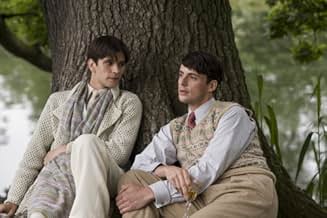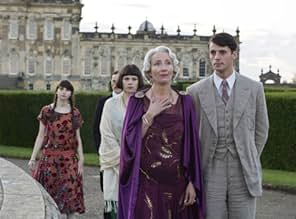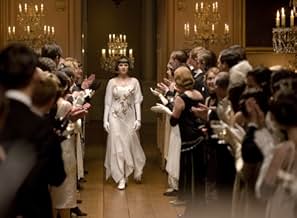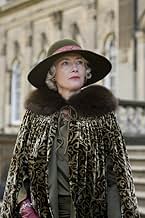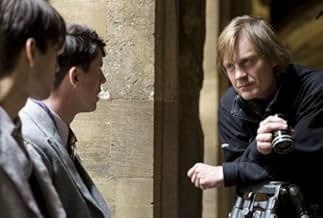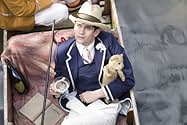IMDb-BEWERTUNG
6,6/10
13.989
IHRE BEWERTUNG
Eine ergreifende Geschichte über verbotene Liebe und den Verlust der Unschuld, die in England vor dem Zweiten Weltkrieg spielt.Eine ergreifende Geschichte über verbotene Liebe und den Verlust der Unschuld, die in England vor dem Zweiten Weltkrieg spielt.Eine ergreifende Geschichte über verbotene Liebe und den Verlust der Unschuld, die in England vor dem Zweiten Weltkrieg spielt.
- Regie
- Drehbuch
- Hauptbesetzung
- Auszeichnungen
- 11 Nominierungen insgesamt
Empfohlene Bewertungen
I have never read the book or seen the miniseries, so my experience wasn't clouded by already existing expectations and assumptions of the characters. Instead I was awaiting a first, and therefore unbiased look into the world of Brideshead.
As a film, it is okay bordering on good and solid. The performances are strong enough to keep the audience interested, but they do not keep us enthralled. The leads are savvy and sexy in their own rights, but they lack true appeal as performers. They can come off as rather dull in certain scenes, but in others they pull out a subtle presence that is called for in intimate, or more emotion scenes. This inconsistence was bothersome and hindered the overall telling of the story. The one presence that is felt, but is far too short is that of Emma Thompson. As the matriarchal head of the family, she is brutal and works well with the one dimensional writing she was given. If they had focused more on her, we would have been able to understand the tortured minds of Julia and Sebastian better. Instead they have Julia and Sebastian describe her to the audience, which keeps us from getting close enough to realize what deformed her mind to begin with.
Charles is, at times to weak and unsure to be accepted as someone we want to see happy. We end up being unsure of his character's intention, and not in a mysterious, purposeful way, but in a, "the film-making is too unclear" way. Is Charles just a social climber whose dreams are dashed by his wants and Atheist ways? Or is he a moral soul lost in the pull of Brideshead's condemning Catholic trappings? This is the major flaw to the film, Charles is never exposed.
Small framing problems and out-of-style shots hampered the visual appeal, but with that aside, the visuals are very lush and the score complements some well placed montages to give the viewer a true sense of the desired never-ending summer Charles and Sebastian so desperately dream after.
If you like British tales of class and religion, or period films, this one is not a letdown. It is nothing new, but nothing terrible either. I recommend it if this is your sort of thing, I was not disappointed, but I wasn't blown away.
As a film, it is okay bordering on good and solid. The performances are strong enough to keep the audience interested, but they do not keep us enthralled. The leads are savvy and sexy in their own rights, but they lack true appeal as performers. They can come off as rather dull in certain scenes, but in others they pull out a subtle presence that is called for in intimate, or more emotion scenes. This inconsistence was bothersome and hindered the overall telling of the story. The one presence that is felt, but is far too short is that of Emma Thompson. As the matriarchal head of the family, she is brutal and works well with the one dimensional writing she was given. If they had focused more on her, we would have been able to understand the tortured minds of Julia and Sebastian better. Instead they have Julia and Sebastian describe her to the audience, which keeps us from getting close enough to realize what deformed her mind to begin with.
Charles is, at times to weak and unsure to be accepted as someone we want to see happy. We end up being unsure of his character's intention, and not in a mysterious, purposeful way, but in a, "the film-making is too unclear" way. Is Charles just a social climber whose dreams are dashed by his wants and Atheist ways? Or is he a moral soul lost in the pull of Brideshead's condemning Catholic trappings? This is the major flaw to the film, Charles is never exposed.
Small framing problems and out-of-style shots hampered the visual appeal, but with that aside, the visuals are very lush and the score complements some well placed montages to give the viewer a true sense of the desired never-ending summer Charles and Sebastian so desperately dream after.
If you like British tales of class and religion, or period films, this one is not a letdown. It is nothing new, but nothing terrible either. I recommend it if this is your sort of thing, I was not disappointed, but I wasn't blown away.
Is this film a worthy interpretation of "Brideshead Revisited"? Well, up to a point, Lord Copper, as another one of Evelyn Waugh's characters was wont to say.
First, scriptwriter Andrew Davies, a past master of adaptation of great and not-so great literary works, has put the focus on the Charles and Julia love story rather than the Charles and Sebastian 'romantic friendship' as Cara, Lord Marchmain's Italian mistress puts it. The religious aspect is dealt with almost incidentally.
Second, Lady Marchmain, as played by Emma Thompson, is a very grim person with total emotional control over her children and whose particular Christian beliefs means that she is indifferent to their suffering as to her this life is a mere precursor to the glorious afterlife the same attitude as a 9/11 hi-jacker in fact. She has none of the sweetness that Claire Bloom brought to the 1981 TV series.
Third, some of the performances owe a good deal to those in the TV series, especially Matthew Goode as Charles who has an uncanny likeness to Jeremy Irons. And of course Castle Howard reprises its role as Brideshead. Some characters were reduced to ciphers; for example Bridey who played by Simon Jones stole several scenes in 1981 but the part is reduced to a non-entity here. Michael Gambon, a consummate actor, gives us a new take on Lord Marchmain to compare with Lawrence Olivier's earlier version.
Overall, though, I was left with the impression this film has not much to say which is new. Like the recent feature film version of "Pride and Prejudice", it gives a broad outline of the story but misses out much of the rich context provided by the minor characters. Oh, read the book instead.
First, scriptwriter Andrew Davies, a past master of adaptation of great and not-so great literary works, has put the focus on the Charles and Julia love story rather than the Charles and Sebastian 'romantic friendship' as Cara, Lord Marchmain's Italian mistress puts it. The religious aspect is dealt with almost incidentally.
Second, Lady Marchmain, as played by Emma Thompson, is a very grim person with total emotional control over her children and whose particular Christian beliefs means that she is indifferent to their suffering as to her this life is a mere precursor to the glorious afterlife the same attitude as a 9/11 hi-jacker in fact. She has none of the sweetness that Claire Bloom brought to the 1981 TV series.
Third, some of the performances owe a good deal to those in the TV series, especially Matthew Goode as Charles who has an uncanny likeness to Jeremy Irons. And of course Castle Howard reprises its role as Brideshead. Some characters were reduced to ciphers; for example Bridey who played by Simon Jones stole several scenes in 1981 but the part is reduced to a non-entity here. Michael Gambon, a consummate actor, gives us a new take on Lord Marchmain to compare with Lawrence Olivier's earlier version.
Overall, though, I was left with the impression this film has not much to say which is new. Like the recent feature film version of "Pride and Prejudice", it gives a broad outline of the story but misses out much of the rich context provided by the minor characters. Oh, read the book instead.
I haven't read Evelyn Waugh's famous 1945 novel or seen Granada's acclaimed 1981 television adaptation. so I approached the story fresh, as indeed will most viewers of this quintessentially England tale of the repressive nature of religion and class. I understand that the adaptation by Andrew Davies and Jeremy Brock has taken some liberties with the original, more subtle narrative, but this is inevitable in a work of just 133 minutes compared to the 11 episodes of the television series.
Directed by the English Julian Jarrold who made "Becoming Jane", the film has many strengths. There are wonderful locations in Oxford, Venice, Morocco and above all Castle Howard in North Yorkshire standing in - as in the television version - as the eponymous country house that is almost a character in itself. The script contains some fine lines - often very cutting and very cruel. Above all, there is some accomplished acting, both from veterans Michael Gambon and Emma Thompson as Lord and Lady Marchmain and newcomers Ben Whishaw and Hayley Attwell as their son Sebastian and daughter Julia and Matthew Goode as Charles Ryder, a young artist who falls in love in different ways with both Sebastian and Julia as well as their home and style.
Sadly, however, ultimately the whole film seems somewhat pedestrian and leaves one feeling strangely cold and disconnected.
Directed by the English Julian Jarrold who made "Becoming Jane", the film has many strengths. There are wonderful locations in Oxford, Venice, Morocco and above all Castle Howard in North Yorkshire standing in - as in the television version - as the eponymous country house that is almost a character in itself. The script contains some fine lines - often very cutting and very cruel. Above all, there is some accomplished acting, both from veterans Michael Gambon and Emma Thompson as Lord and Lady Marchmain and newcomers Ben Whishaw and Hayley Attwell as their son Sebastian and daughter Julia and Matthew Goode as Charles Ryder, a young artist who falls in love in different ways with both Sebastian and Julia as well as their home and style.
Sadly, however, ultimately the whole film seems somewhat pedestrian and leaves one feeling strangely cold and disconnected.
The greatness of the original Brideshead Revisited was in the luxury of being able to transpose a very complicated emotional and intellectual book into words. It succeeded in this, but only just, due to superb direction, photography and script which, even in its sparseness, only just allowed the successful transition to film. The problem with anything shorter is that, if it took Mortimer so many episodes to get it right, then there are very few writers who could even get near in under 4 hours, if that. So lets stop beating about the bush. This is a sound reproduction of the calender plot but after that it is not Brideshead Revisited. Call it by another name and I will laud it. It brings in a strong homosexual element and a early sexual attraction between Charles Ryder and Miss Flyte. With that everything becomes unbalanced. Motivations change. The beauty of the original is that it hinted at ????something (a je ne sais quoi) and it was that and the ever strengthening Catholic awareness of family that made this film so fascinating. The original's masterpiece was the script supported by the cine photography. That has been lost. But taken as is, a pretty and interesting film which seems to be loosely based on an early fifties work by Waugh.
It's attributed to just about everybody - from Ginger Rogers to Milan Kundera - and it sounds so right: "There are no small parts, only small actors."
If you want proof and a real understanding of the adage, revisit "Brideshead Revisited," and behold the miracle of Emma Thompson's Lady Marchmain, sucking the life out of anything and anybody she touches, and Michael Gambon's delightfully dissolute Lord Marchmain. She has about 10 minutes on the screen, he perhaps four, and yet their characters will follow you out of the theater, and stay with you at length.
Thompson's work is especially dazzling because the mean, sanctimonious character is so clearly alien to the actress (in fact, I suspected miscasting when I first heard of her assignment) and also as the character is so exaggerated, almost a caricature. And yet, Thompson gives the challenge her all, and walks away with it; the performance has Best Supporting Actress written all over it.
It's difficult to believe that the man you see as Marchmain is the same actor who was the "Singing Detective" (of the superb BBC series, not the Robert Downey Jr. mishap). Gambon has a range as wide as all outdoors, and you never ever see effort in the performance. His amiable Marchmain - subtly hinting at a complex character under the surface - has a physical similarity to Gambon's Uncle Vanya on the London stage, but otherwise, it's a unique creation.
What else is there to this new "edition" of "Brideshead"? A great deal, but only if you're among those who missed both Evelyn Waugh's novel and the wonderful Granada TV realization 27 long years ago - Irons! Gielgud! Olivier! - how can you compete with that? So, if it's a first-time visit, see the movie by all means; if you can recite lines from the book or the TV series, you can survive without the new version.
In 135 minutes, the film is handling well what the TV series did so completely in - yes - 13 HOURS. Obviously, except for the basic story line (script by Jeremy Brock, of "The Last King of Scotland"), this is a different kind of animal, still "leisurely" enough, but unable to luxuriate in the smallest details as the series did. The director is Julian Jarrold, and he is doing far better than in his recent "Becoming Jane," keeps the story moving in a smooth fashion.
As to the leading roles in the film, they are all well acted, but without great impact. Matthew Goode is Charles Ryder, the focal character; Ben Whishaw is the slightly over-flamboyant Sebastian Flyte (who needs understating more than exaggerating - Anthony Andrews' performance in the TV series was exactly right); Hayley Atwell is Sebastian's sister (and rival for Charles' affection).
One amazing thing about "Brideshead" is how this story from a different time, about characters from a different world, remains interesting and meaningful. It's almost as if Waugh's work was bulletproof - not that these filmmakers were less than respectful to the author. A better test would be a Eurotrash opera version, heaven forfend.
If you want proof and a real understanding of the adage, revisit "Brideshead Revisited," and behold the miracle of Emma Thompson's Lady Marchmain, sucking the life out of anything and anybody she touches, and Michael Gambon's delightfully dissolute Lord Marchmain. She has about 10 minutes on the screen, he perhaps four, and yet their characters will follow you out of the theater, and stay with you at length.
Thompson's work is especially dazzling because the mean, sanctimonious character is so clearly alien to the actress (in fact, I suspected miscasting when I first heard of her assignment) and also as the character is so exaggerated, almost a caricature. And yet, Thompson gives the challenge her all, and walks away with it; the performance has Best Supporting Actress written all over it.
It's difficult to believe that the man you see as Marchmain is the same actor who was the "Singing Detective" (of the superb BBC series, not the Robert Downey Jr. mishap). Gambon has a range as wide as all outdoors, and you never ever see effort in the performance. His amiable Marchmain - subtly hinting at a complex character under the surface - has a physical similarity to Gambon's Uncle Vanya on the London stage, but otherwise, it's a unique creation.
What else is there to this new "edition" of "Brideshead"? A great deal, but only if you're among those who missed both Evelyn Waugh's novel and the wonderful Granada TV realization 27 long years ago - Irons! Gielgud! Olivier! - how can you compete with that? So, if it's a first-time visit, see the movie by all means; if you can recite lines from the book or the TV series, you can survive without the new version.
In 135 minutes, the film is handling well what the TV series did so completely in - yes - 13 HOURS. Obviously, except for the basic story line (script by Jeremy Brock, of "The Last King of Scotland"), this is a different kind of animal, still "leisurely" enough, but unable to luxuriate in the smallest details as the series did. The director is Julian Jarrold, and he is doing far better than in his recent "Becoming Jane," keeps the story moving in a smooth fashion.
As to the leading roles in the film, they are all well acted, but without great impact. Matthew Goode is Charles Ryder, the focal character; Ben Whishaw is the slightly over-flamboyant Sebastian Flyte (who needs understating more than exaggerating - Anthony Andrews' performance in the TV series was exactly right); Hayley Atwell is Sebastian's sister (and rival for Charles' affection).
One amazing thing about "Brideshead" is how this story from a different time, about characters from a different world, remains interesting and meaningful. It's almost as if Waugh's work was bulletproof - not that these filmmakers were less than respectful to the author. A better test would be a Eurotrash opera version, heaven forfend.
Wusstest du schon
- WissenswertesDame Emma Thompson threatened to quit this movie if the producers persisted in pushing actress Hayley Atwell to lose weight. Atwell said that Harvey Weinstein even insulted her over lunch by saying: "You look like a fat pig on-screen. Stop eating so much."
- PatzerAfter the dinner, at which Charles first meets Lady Marchmain, the family go to pray in the private chapel. The ladies, as Roman Catholics, would have covered their heads with a scarf or a veil.
- Zitate
Sebastian Flyte: I asked too much of you. I knew it all along, really. Only God can give you that sort of love.
Top-Auswahl
Melde dich zum Bewerten an und greife auf die Watchlist für personalisierte Empfehlungen zu.
Details
- Erscheinungsdatum
- Herkunftsländer
- Offizieller Standort
- Sprachen
- Auch bekannt als
- Brideshead Revisited
- Drehorte
- Produktionsfirmen
- Weitere beteiligte Unternehmen bei IMDbPro anzeigen
Box Office
- Budget
- 20.000.000 $ (geschätzt)
- Bruttoertrag in den USA und Kanada
- 6.432.256 $
- Eröffnungswochenende in den USA und in Kanada
- 339.616 $
- 27. Juli 2008
- Weltweiter Bruttoertrag
- 13.451.186 $
- Laufzeit2 Stunden 14 Minuten
- Farbe
- Sound-Mix
- Seitenverhältnis
- 2.35 : 1
Zu dieser Seite beitragen
Bearbeitung vorschlagen oder fehlenden Inhalt hinzufügen

Oberste Lücke
By what name was Wiedersehen mit Brideshead (2008) officially released in India in English?
Antwort

